#It’s about the loyalty to the mission to an extent that it erases your humanity
Text
do you think i want to be here?
a big part of sylvie’s character that gets overlooked is shown in one particular line in s2 ep3 when she explains to loki why she has to kill victor: do you think i want to be here? do you think i’m gonna get any joy out of killing that man?
because that is what she has done, for centuries, is bring death. she’s run from one end of the world to the next, watching the connections she makes fall apart. what good would more killing bring to her? how would ending this trembling man before her repair any of the damage she has sustained? the minutemen she burned to get to he who remains were all variants, too, but she needed to do it. like she needed to kill hwr, like she needed to kill victor. what pleasure would more death give her at this point, after it has so thoroughly stained her it’s almost baptismal?
what she wants is the softness of the ordinary, a uniform, a job- but her moral compass requires her to be a blade, and so she will. there is no joy in the ending of lives, especially in the name of freeing the destinies of the multiverse. she feels no love for death despite it raising her. her whole life has been more a means to an end more than that of an individual experiencing the universe.
so if that means she must once again plunge her sword into a chest, she feels that she has been summoned once again to do her duty, and she must. even while she trembles at the thought, paces back and forth, and cries at what she knows she must do.
except, this time, she can’t.
#characters who see themselves as weapons dedicated to a cause more than individuals are so special to me#It’s about the loyalty to the mission to an extent that it erases your humanity#That doing the right thing can come at any cost and that cost can be yourself#and i find Sylvie to embody this perfectly#The setting aside of any sort of desire to accomplish The End Goal of free will#sylvie you are more than a blade. you deserve softness and to learn who you are outside of death.#there’s more to be said about the innocent face of victor being the only thing after centuries to break her willpower#and i have said things about it in the past and will likely say more things about it#but there is this nebulous complexity to her that fan characterization has denied the complexity of#it makes my heart ache. it is a life of sacrifice she leads.#anyway.#loki series#sylvie#sylvie laufeydottir#loki s2#loki#loki tv show#loki meta#juni analysis
38 notes
·
View notes
Text
Episode 21: The Battle of Doria Starzone, and...

Spring 797/488. En route toward Heinessen, Yang’s fleet encounters Baghdash, a supposed deserter who is very obviously there to assassinate Yang—not before taking a nap, though, which gives Schenkopp the chance to lock him in deep sleep mode while Yang and co. make pretty quick work of the 11th fleet, which was sent to intercept them. Instead of the dishonor of surrender, the commander of the 11th fleet chooses to fight until all but a handful of his soldiers have been killed, and then commits suicide. Meanwhile on Heinessen, Admiral Greenhill’s whole “if I didn’t lead these young’uns bad things would happen” schtick proves rather pointless when, despite Greenhill urging restraint, the unit sent to break up a peaceful protest ends up inciting a riot that kills 20,000 people, including the organizer, Representative Jessica Edwards.
Julian and Yang
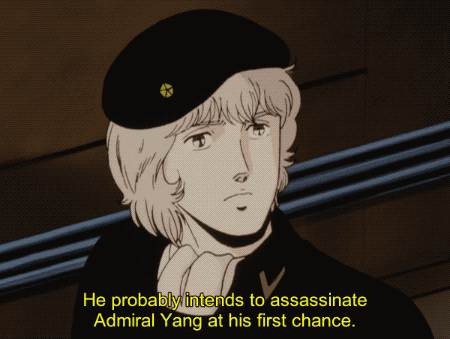
Close your mouth, Julian, a bug will fly in. Or possibly a bird or small spacecraft.
Julian said he would protect Yang back when he was first learning to shoot, and a real opportunity presents itself for the first time when Baghdash shows up on his mission to assassinate Yang. Schenkopp forestalls Baghdash’s plans in pretty undramatic (but hilarious) fashion, adjusting his tank bed to keep him asleep for the whole battle (hey, look at that worldbuilding about tank beds from episode 1 having actual plot payoff!); and when Baghdash wakes up to find the 11th fleet annihilated, he pragmatically offers his loyalty to Yang, who he now believes will be the ultimate victor.

Feel familiar? This is essentially the same scene as when Reinhard gave Ferner to Oberstein, recast with Alliance personnel.
Yang seems to feel he has a good read on Baghdash’s self-preservation instincts and has no qualms trusting him; he even temporarily bequeaths his own gun to Baghdash, since he himself never even carries it.

This is a move Yang has pulled before, acquiring personal loyalty by putting perhaps undue amounts of trust in people—he did this with Schenkopp and the Rosen Ritter when he relied on them to infiltrate Iserlohn.
Baghdash “jokingly” points the gun at Yang before lowering it and saluting, which leads to this masterful piece of cinematography.

My, they grow up so fast...
To appreciate the context of this scene, let’s back up and take a moment to peruse a photo album of the last year and a half of Julian’s life.

From making Yang tea and keeping house for him on Heinessen…
(Episode 3, early 796)

...to trotting earnestly around after him in Thernusen…
(Episode 10, mid 796)

...to getting to tag along to Iserlohn as an orderly…
(Episode 16, late 796)

...to pledging to protect Yang if necessary…
(Episode 17, early 797)
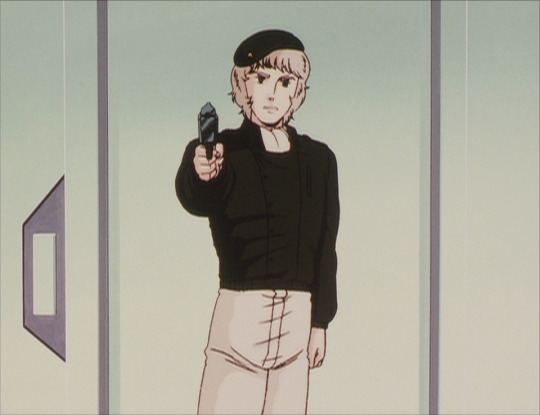
...to now. Mid 797, fifteen years old. Threatening to shoot a man for the crime of possibly contemplating killing someone Yang.
It’s impossible to talk about Julian without talking about his role in Yang’s life, because such a huge part of his own conception of his identity has to do with struggling to figure out exactly what that role is. We’ve seen his hero-worship manifest as copying Yang’s style and body language in the past, and he eagerly soaks up Yang’s lectures about battle tactics; but at the same time ever since his very first introduction it’s been clear that Julian’s own goals and skills are distinct from—even opposite—Yang’s: he enjoys cooking and cleaning while Yang is hopelessly lazy; he dreams of becoming a soldier while Yang dreams of escaping the military; he excels at physical combat while Yang apparently can’t hit the broad side of a barn.
These differences are part of why Julian sees himself as serving a purpose—he can do the various physical labor that doesn’t come naturally to Yang—but they’ve also introduced tension into their relationship starting way back in episode 3.

After responding to Julian’s expressed wish to become a soldier by ranting about how much he dislikes both soldiers and the war, Yang tells a rather downcast Julian that they’ll continue the discussion some other time. The only person who’s happy in this shot is Gensui, smiling smugly in the corner. We see you Gensui. Stop laughing at the humans’ drama.
The point of this little Julian Retrospective isn’t to show a transformation from meek housekeeper into badass soldier; on the contrary, Julian’s ambitions to join the military have been a constant of his character from the beginning, and so has his instinct to rush to Yang’s defense physically.

Did you think I could pass up a chance to show my favorite moment from episode 10 again? I told you this gif never gets old. Hang in there Julian, your moment will come!
But while Yang’s overt disapproval of Julian’s chosen path creates some background tension between them, we’ve never actually seen Julian be anything but deferential and eager to please in his direct interactions with Yang.
Until now.

I’m obsessed with Yang’s change of expression here. He goes from an initial (rather impressed) “holy shit Julian means business” reaction to, when Baghdash appeals to him, a more solemn “oh yeah it’s probably my job here to make sure Julian doesn’t actually shoot the guy” face.

Getting over his initial surprise, Yang adopts extremely relaxed body language as if to intentionally counter Julian’s rigid, aggressive pose and diffuse the tension. But Julian is not having it. The key line here is his blunt contradiction of Yang: “Riyuu wa arimasu!”—“There *is* a reason!”—which, while still in polite speech, is delivered with authority and without any markers of humility or deference.
Julian is there to protect Yang from a threat as he perceives it, in his own way, even if that means going against Yang’s own view of the situation and preferred way to handle it. This moment emphasizes that while Julian would—perhaps literally—kill for Yang, he is not trying to fashion himself into a mini-Yang, or even to stuff himself in a box labeled “Yang’s ideal protégé.” His identity is deeply tied to Yang but not erased by him.
Of course, Julian may be the one pointing a gun, but the actual authority in the room still resides with Yang—as becomes clear when Yang finally, laughing, orders Julian to stand down and dismisses Baghdash.

The timing of Yang’s laugh, after several seconds of silently letting Julian stand there looking badass, makes it feel more like a calculated strategy to diffuse the situation than something spontaneous.
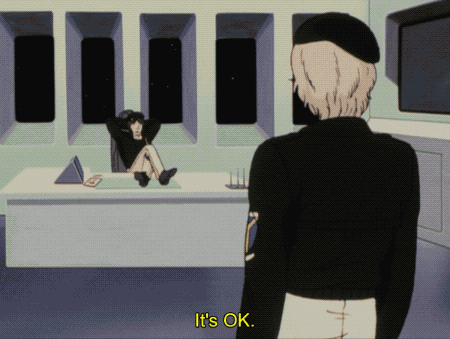
The verb form here is actually the causative, “Hito-goroshi wa sasetakunai yo.”—“I don’t want to make you murder anyone.”
Far from acting upset with Julian’s theatrics, Yang seems some combination of proud and just kind of tickled. But despite Yang’s smile and his explanation of why he’s not worried about Baghdash, Julian’s expression remains angry; he may have argued further, but they’re interrupted by news from Heinessen...
Jessica
The rest of this episode is much less fun than watching Julian level guns at people. When 200,000 citizens gather in a stadium for a peaceful rally protesting the National Salvation Military Council’s takeover of their government, the council sees it as a challenge and sends a unit in to break it up and “restore order.” This leads to absolutely chilling scenes where the leader of that unit (whose name I neither know nor care about, fuck this guy) attempts to show that true power comes through violence by making an example of ten random people.

The question of whether there’s something inherently righteous about being willing to die for a cause is one that pervades the whole episode (and more broadly is one of the recurring themes of the show). I’ve talked before about how Yang is differentiated from many of the other Alliance commanders by his hatred of rhetoric about death being noble and honorable—in his tea speech in episode 6, for example, he motivates his soldiers to fight not for the glory of dying for a good cause but so that they can live to drink more good tea. This same contrast is again underlined by the speeches that Admiral Legrange and Yang give to their fleets before the battle in this episode.

Just like the asshole violently intimidating the crowd at the rally, this speech conflates courage with self-sacrifice, to the extent of willingly giving your life.

Also reinforced here is Yang’s belief in personal freedom and self-determination as the most important ideals, over allegiance to any particular nation or government. He’s not fighting against the military coup because the former Alliance government was so great, but because (as he told Schenkopp in episode 19) he sees the oppressive rule by force of the NSMC as worse.
It’s Jessica, the organizer of the rally, who delivers the most eloquent and impassioned critique of this equation of violence and death with righteousness; in response to the attacks against civilians she quickly steps forward to intervene:
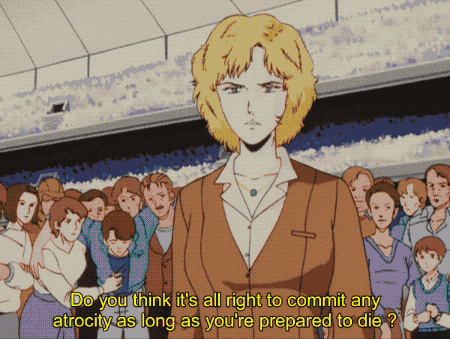
This is a beautiful speech, but it has the effect of angering the asshole commander so much that he lashes out violently against her, which ultimately escalates into an all-out riot. It’s brutal and horrible to watch, and in the end over 20,000 people have been killed. Including Jessica.

Obviously Jessica is right on the front lines of her own battle. I love this line, as she steps forward out of the crowd to confront the military force: her “koko ni imasu” echoes the accusations of “doko ni imasu?” (“where are you?”) she leveled at Trunicht in her speech in episode 3. Unlike Trunicht and the other politicians, she is right there.
One thing to note about Jessica’s death is that unlike her fiancé Lapp, she is not fridged—her death is very much about her, her own principles and resistance against the oppression being carried out in her society. And while she has a semi-romantic history with Yang, this riot is not a plot device to somehow change his plans or how he approaches fighting the military council. In fact after we see him first react to the news, he never brings it up again. Jessica’s story is about her fight, not someone else’s.
History
Which brings us back to Yang’s office, where Frederica has just interrupted Julian and Yang’s discussion of (argument about?) Baghdash to tell Yang about the riot and Jessica’s death.
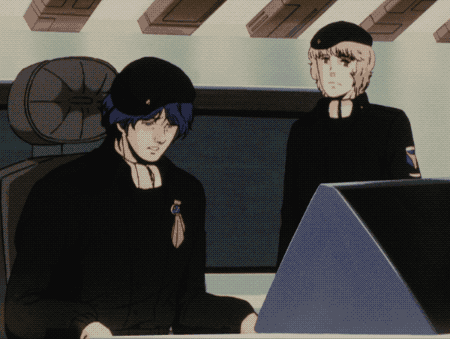
Until this moment, the show’s narrator has confined himself to either telling us facts about dates, locations, number of casualties, etc., or making vague, general claims about the nature of war. What he tells us here is different: “They say Yang Wenli said not a single word.” This is neither a fact of public record nor general academic philosophizing. It’s specific personal information which we can see, since we’re watching the scene unfold behind the narration, that only one person other than Yang himself could know. Hmm.
Stray Tidbits
Schenkopp spilling coffee on his uniform in a (pretty transparent?) attempt to distract Baghdash from inquiring further about Frederica is a cute callback to his first introduction, in which he flings a pot of coffee all over a bunch of random assholes who were yelling at a waitress for defiling their uniforms.

I cannot overstate how hilarious I find Dusty’s signature strategy of fucking with enemy fleets by alternately retreating and advancing. It’s adorable, smart, and strangely erotic all at the same time. Dusty, you are the best, never change.



I love the worldbuilding of all the random battle jargon that flies by in the background of this fight. I'm gonna qualify any directions I give from now on with "relative to the standard galactic plane."

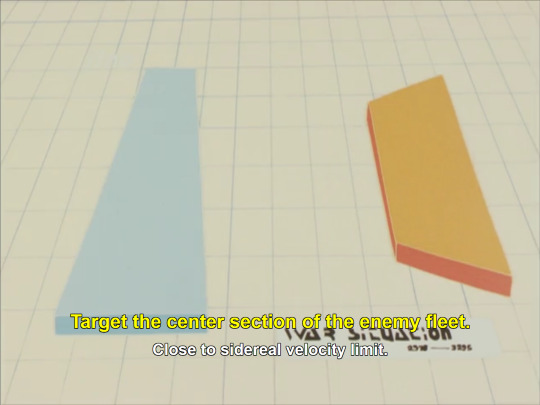

You know you wanted this reaction gif, and we are here to give the people what they want. As long as what they want is cute Julian gifs, at least.
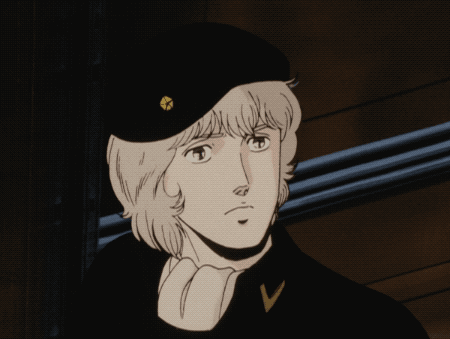
#Legend of Galactic Heroes#Legend of the Galactic Heroes#author: Rebecca#Alliance#battle#Jessica#Julian#Yang#Gensui#badass!Julian#history#death#narrator
16 notes
·
View notes